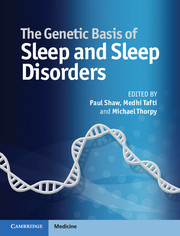Book contents
- The Genetic Basis of Sleep and Sleep Disorders
- The Genetic Basis of Sleep and Sleep Disorders
- Copyright page
- Contents
- Foreword
- Preface
- Contributors
- Abbreviations
- Section 1 Generalprinciples of genetics and genomics
- Section 2 Geneticsof sleep and circadian rhythms
- Chapter 4 Genetic epidemiology of sleep and sleep disorders
- Chapter 5 Drosophilamodel systems for genetic sleep research
- Chapter 6 Caenorhabditis elegansand zebrafish in sleep research
- Chapter 7 Optogenetic control of arousal neurons
- Chapter 8 Prostaglandin D2in the regulation of sleep
- Chapter 9 Astroglial regulation of sleep
- Chapter 10 The role of metabolic genes in sleep regulation
- Chapter 11 A systems biology approach for uncovering the genetic landscape for multiple sleep–wake traits
- Chapter 12 Genetic control of the circadian pacemaker
- Chapter 13 Epigenetic basis of circadian rhythms and sleep disorders
- Section 3 Sleepphysiology and homeostasis
- Section 4 Insomnias
- Section 5 Narcolepsyand hypersomnias
- Section 6 Sleep-related breathing disorders
- Section 7 Circadian rhythm sleep disorders
- Section 8 Parasomniasand sleep-related movement disorders
- Section 9 Psychiatricand medical disorders
- Section 10 Medication effects
- Index
Chapter 11 - A systems biology approach for uncovering the genetic landscape for multiple sleep–wake traits
from Section 2 - Geneticsof sleep and circadian rhythms
Published online by Cambridge University Press: 05 November 2013
- The Genetic Basis of Sleep and Sleep Disorders
- The Genetic Basis of Sleep and Sleep Disorders
- Copyright page
- Contents
- Foreword
- Preface
- Contributors
- Abbreviations
- Section 1 Generalprinciples of genetics and genomics
- Section 2 Geneticsof sleep and circadian rhythms
- Chapter 4 Genetic epidemiology of sleep and sleep disorders
- Chapter 5 Drosophilamodel systems for genetic sleep research
- Chapter 6 Caenorhabditis elegansand zebrafish in sleep research
- Chapter 7 Optogenetic control of arousal neurons
- Chapter 8 Prostaglandin D2in the regulation of sleep
- Chapter 9 Astroglial regulation of sleep
- Chapter 10 The role of metabolic genes in sleep regulation
- Chapter 11 A systems biology approach for uncovering the genetic landscape for multiple sleep–wake traits
- Chapter 12 Genetic control of the circadian pacemaker
- Chapter 13 Epigenetic basis of circadian rhythms and sleep disorders
- Section 3 Sleepphysiology and homeostasis
- Section 4 Insomnias
- Section 5 Narcolepsyand hypersomnias
- Section 6 Sleep-related breathing disorders
- Section 7 Circadian rhythm sleep disorders
- Section 8 Parasomniasand sleep-related movement disorders
- Section 9 Psychiatricand medical disorders
- Section 10 Medication effects
- Index
Summary
Keywords
Information
- Type
- Chapter
- Information
- The Genetic Basis of Sleep and Sleep Disorders , pp. 104 - 118Publisher: Cambridge University PressPrint publication year: 2013
Accessibility standard: Unknown
Why this information is here
This section outlines the accessibility features of this content - including support for screen readers, full keyboard navigation and high-contrast display options. This may not be relevant for you.Accessibility Information
- 1
- Cited by
